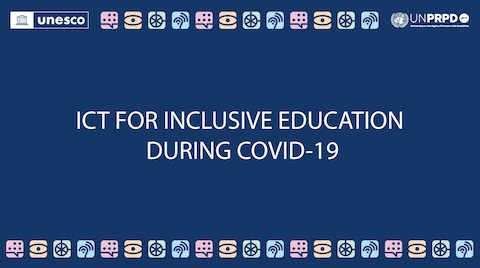
GCED Basic Search Form
Quick Search
You are here
News

The COVID-19 pandemic has exacerbated inequities in access to educational opportunities of marginalized populations, especially people with disabilities. While many countries in the world have taken a number of measures to address these inequities through a range of open and distance learning (ODL) solutions, emerging evidence indicates that these solutions have rarely been inclusive of students with disabilities.
To support countries and other global initiatives to incorporate a strong disability inclusive perspective to COVID-19 response and recovery, the United Nations Partnership on the Rights of Persons with Disabilities (UNPRPD) launched the Global Programme Supporting Disability Inclusive COVID-19 Response and Recovery at National Level. This global programme, entitled ‘Building Back Better for All’, has enabled research investigations that leverage the experience of UN agencies, organizations of persons with disabilities and broader civil society. In 2021, IITE, the UNESCO International Institute for Educational Planning (IIEP) and UNESCO Headquarters (HQs) joined forces to contribute to the successful implementation of this programme.
In January-June 2021, IITE and IIEP jointly undertook a research project aimed to increase national understanding of the range and reach of inclusive open and distance learning (ODL) solutions applied for students with disabilities in Rwanda and Mauritius and the barriers to their implementation during the COVID-19 pandemic, and inform upcoming national education COVID -19 recovery initiatives. To achieve the project’s tasks, IITE and IIEP conducted rapid assessments of the implementation of inclusive ODL solutions by inclusive, special schools, and resource centers in Rwanda and Mauritius to address the negative effects of the COVID-19 pandemic on learning for students with disabilities, as well carried out a case study in Mauritius to collect and analyze best practices in this field.
Based on the findings of the conducted analysis, IITE and IIEP developed a Case Study ‘COVID 19, technology-based education and disability: The case of Mauritius. Emerging practices in inclusive digital learning for students with disabilities’ and the Analytical Report on ‘A rapid assessment of the development and implementation of inclusive open and distance learning solutions for students with disabilities served by inclusive, special schools and resource centres in Rwanda and Mauritius’.
On June 15 2021, IITE and IIEP organized an international webinar on ‘Technology-enabled inclusive education: Emerging practices from COVID-19 for learners with disabilities’ with the participation of 230 experts from different countries. The webinar allowed to present key research results and recommendations related to the implementation of technology-enabled ODL initiatives and to have an open discussion about lessons learned in order to explore ways to enhance future initiatives.
In June 2021, based on the gathered data from the rapid assessment and case study reports, IITE and the Division for Education 2030 Support and Coordination at UNESCO HQs prepared a Policy Brief on ‘Understanding the impact of COVID-19 on education of persons with disabilities: Challenges and opportunities of the distance education’. The Policy Brief included conclusions and recommendations developed based on the findings of recent studies undertaken in the COVID-19 context in Africa (specifically, in Rwanda and Mauritius), Asia (Bangladesh) and South America (Colombia) regarding inclusive education for learners with disabilities.
The activities performed by IITE, IIEP and UNESCO Headquarters within the UNPRPD programme contribute to strengthening global collaboration and creating an encouraging ecosystem for ongoing ODL and help promoting the idea of the development of a system–wide educational reform where multiple channels to diverse learning opportunities are recognized and learning beyond formal education is encouraged.
URL:
